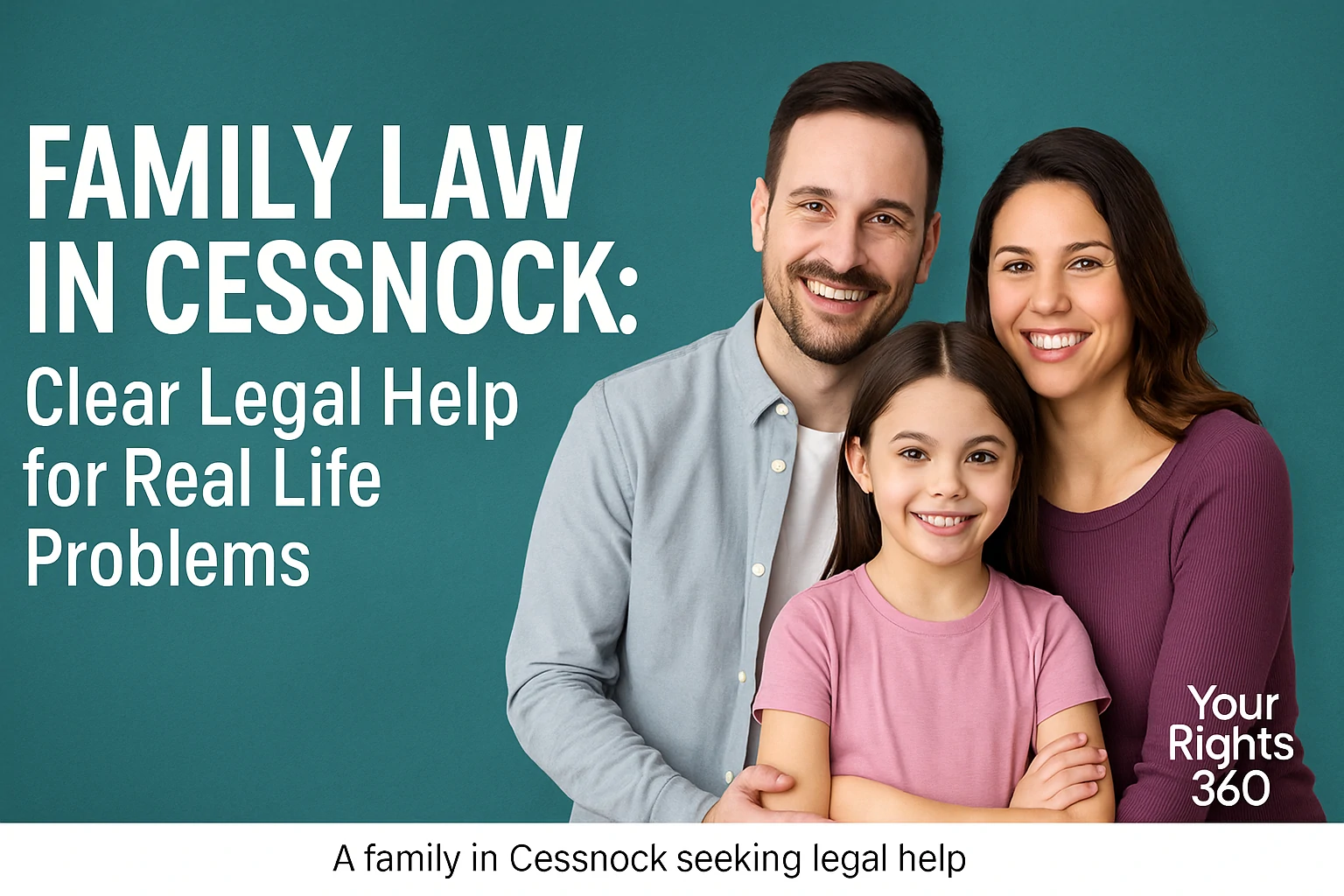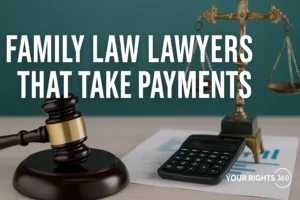Family law deals with real people and real problems. It helps parents, partners, and children during hard times. These problems often involve divorce, children, money, or safety. In Cessnock, family law follows national rules. The main law is the Family Law Act 1975.
When a couple ends a relationship, life changes. Children need care. Homes need fair division. Money becomes a concern. Family law helps sort these matters. Some people find quick answers. Others need court decisions. Every case depends on facts, not feelings.
People in Cessnock can use both local and federal courts. Most family cases go to the Federal Circuit and Family Court of Australia. Urgent cases may reach the local court first. That happens when someone needs protection or fast action.
The law may seem hard, but the process is clear. You start with facts. You fill out forms. You go to court when needed. The court listens to both sides. Then it makes a legal order. If you feel unsure, legal aid and community groups offer support. They help you take each step with care.
Common Family Law Problems
Most family law cases start when two people separate. Some couples end their marriage. Others split up after living together without marriage. Both types of cases go through the same legal system.
Divorce is one of the main steps. The law allows divorce after a couple lives apart for 12 months. The court does not ask why the marriage ended. It only checks if the relationship is over.
Children come first in every case. The court wants to make sure they stay safe, happy, and connected to both parents if possible. Judges decide where the child lives, who they spend time with, and how choices get made.
Money and property often cause problems. The law asks both sides to list what they own and what they owe. Courts then divide assets based on fairness. They check each person’s role in building the home and their future needs.
Spousal support also comes up. If one person cannot pay for daily needs, the other may have to help. This does not happen in every case. The court looks at income, health, and care duties.
In serious cases, safety takes top priority. Victims of abuse can ask for court orders that protect them. These are called ADVOs. They stop the other person from making contact or causing harm.
How Court Works in Cessnock
Most family law cases begin with forms. These forms ask the court to make a decision. You must fill them out, file them with the court, and give a copy to the other party.
After that, the court sets a date. The first step is often a meeting. Both sides explain the issue. The court then tells everyone what to do next. This may include gathering documents or attending mediation.
Mediation helps both sides talk. It takes place before the court hears the full case. If both agree, the case may end without trial. If no deal happens, the court moves forward.
In trial, each side tells their story. They give facts, show records, and ask the judge to decide. The judge then makes a final order. This order tells both sides what to do. It may cover custody, money, or safety.
Once the court makes a final order, you must follow it. Breaking the order may lead to legal action. You could face fines or worse. If something changes, you can ask the court to update the order.
When to Get Legal Help
Not every case needs a lawyer. But many people feel more secure with one on their side. A lawyer understands court rules. They know what forms to use and how to explain your case.
Cessnock residents have access to support. You can speak with a private lawyer. You can also get help from Legal Aid NSW. Some local groups offer legal help at little or no cost. These services can guide you and explain your options.
A lawyer does not give false promises. They do not guarantee a win. But they protect your rights and help avoid errors. They speak for you in court. They keep things clear when emotions rise. They also help you protect your children and your property.
Legal advice helps most at the start. Delays cause stress and higher costs. If you get court papers or legal notices, act quickly. Do not wait and hope things fix themselves. A smart move today protects you tomorrow.
Some people wonder if they need a lawyer in custody matters. If you’re unsure, this guide on child custody and legal help explains when to speak to a lawyer and what to expect.
What the Court Expects from You
The court wants honesty. You must tell the truth, share all needed facts, and show respect. Do not hide money, lie about your ex, or bring false claims. The judge will notice and it may hurt your case.
You must also follow timelines. If the court gives a date, meet it. Late forms or missed steps slow down the case. Some delays can lead to extra costs or even case dismissal.
Parents must focus on the child. Courts do not care who hurt whom in the past. They care about what helps the child now and in the future. Show that you can meet your child’s needs and that you want peace.
If a judge gives an order, follow it. You may not like it, but you must obey. If something changes, like a move or job loss, go back to court. Ask the court to update the order the right way.
Mediation and Family Support
Before court, most people must try to settle things through family dispute resolution. This process helps both sides talk. A trained worker listens and helps you find a deal.
This step is not just talk. It helps save time, money, and stress. If you settle the issue here, you may not need a full court case. If talks fail, you get a certificate. You need this to file some types of cases.
Many services offer mediation near Cessnock. Some are free. Others charge a small fee. These include Family Relationship Centres and Legal Aid.
If you feel unsafe, tell the service right away. They can make sure you stay protected during the talks.
Moving Forward After Orders
Once the court makes a final order, life starts to feel clear again. You know what to expect. You know what you can and cannot do.
It takes time to adjust. Parents may need help making shared plans. Children may need time to settle. Money plans may need updates.
Keep track of what happens. Save records of visits, payments, or missed steps. If trouble starts again, these records help your case.
Stay calm and follow the plan. If you need a change, go back to court. Do not try to make changes on your own. That can cause legal problems.
Support is out there. Cessnock has groups for parents, children, and families in conflict. These services can help you rebuild.
Final Thoughts
Family law in Cessnock handles serious parts of life. Divorce, child care, and court orders often bring stress. These moments can shake your peace. But the law stands to help, not harm. It aims to keep things fair and protect those in need.
You have the right to understand your options. You can speak to legal services. You can talk to a lawyer. You can ask the court for clear steps. These choices bring confidence. You do not have to figure it out alone.
Every step matters. If you plan to separate, raise a child, or seek protection, take action early. Do what is right, not what is easy. The court respects honesty, effort, and care.
Your future begins with the steps you take now. Use the support around you. Know the law. Trust the process. You can get through it with strength and smart choices.
You can also explore a flat fee family law attorney if you want clear costs from the start.
Common Questions
Q. What can I do if my ex refuses to follow a court order?
You can go back to court and ask for enforcement. The court may issue penalties or update the order. Keep a record of each issue.
Q. How much does a divorce cost in Cessnock?
There is a set filing fee, plus any lawyer costs. If you cannot afford the fee, you can ask for help through a fee waiver.
Q. Do I Need to Live Apart to File for Divorce?
The law asks for 12 months of clear separation. You may stay in the same home but must live separate lives.
Q. Can the Court Divide Property If One Person Paid for Everything?
The court checks both money and care given during the relationship. It also considers future needs before making a fair split.
Disclaimer – Your Rights 360
This content gives general information only. It does not serve as legal advice. Each case is different. Speak to a lawyer before you act. Your Rights 360 is not responsible for actions taken based on this article.




